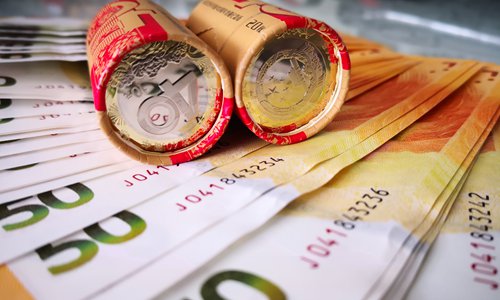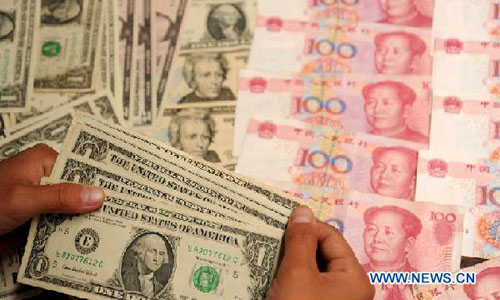HOME >> BUSINESS
Yuan depreciation market’s reaction to US tariff threat, says analyst
By Li Qiaoyi and Xie Jun Source:Global Times Published: 2019/8/5 23:18:32

Commemorative notes issued by the People's Bank of China for the 70th anniversary of the launch of China's renminbi currency. Photo: VCG
China won't use the yuan as a tool to deal with trade conflicts, central bank governor Yi Gang said Monday, vouching for the nation's persistence in the market-oriented yuan following the Chinese currency's slide past a key mark.
On Monday morning, both onshore and offshore yuan weakened past 7 against the US dollar, a key psychological level the Chinese currency hasn't breached since 2008.
China, as a responsible major power, will honor its promise regarding the currency issue made at the G20 leaders' summits. The nation will stick to a market-determined foreign exchange rate system, Yi said in a post on the website of the People's Bank of China (PBC) late Monday.
Neither will China resort to yuan depreciation for competitive purposes nor will it use currency as a tool to deal with external disturbances such as the trade conflicts, he noted.
Yi's comments should sober up US President Donald Trump who has shown an addiction to tariff threats and currency manipulation allegations, Chinese analysts noted.
In a tweet on Monday, Trump wrote, "China dropped the price of their currency to an almost a historic low. It's called 'currency manipulation.'"
"This is a major violation which will greatly weaken China over time," read the tweet.
Trump's accusation doesn't make sense, as the US Treasury has repeatedly refrained from labeling China as a currency manipulator, said Wu Jinduo, head of fixed income at the research institute of Great Wall Securities.
China's monetary policymaking is contingent upon the nation's domestic needs, especially maintaining the yuan's stability, which suggests manipulative moves are not in China's interest, Wu told the Global Times.
New conditions have emerged in the international economic and trade friction landscape and market expectations have changed accordingly. As a result, many currencies have depreciated against the dollar since August, and the yuan's exchange rate has been affected as well, Yi, the central bank governor said, adding that the fluctuations are driven and determined by the markets.
In an earlier statement, the central bank said the yuan will be kept basically stable at a reasonable and equilibrium level, defusing concerns over the yuan's slide past the key level.
The yuan's sudden weakness, according to PBC, was due to multiple factors, including unilateralism, trade protectionist measures and the expectations for the US imposition of tariffs on Chinese products.
In a fresh sign of trade war escalation, Trump on Thursday tweeted a threat to impose an additional 10 percent in tariffs on all remaining $300 billion worth of Chinese imports.
The continuation of trade frictions has led to a marked increase in market uncertainty, and depreciation pressure on the yuan has also placed yuan-denominated assets under pressure, Hong Hao, managing director and head of research at BOCOM International, told the Global Times on Monday.
The yuan's depreciation pressure also indicates the market's expectations for policy easing, he said.
Market watchers generally describe the weakening of the yuan as normal market reactions to Trump's threat of new tariffs as well as the dollar's strength.
The market anticipated the negative impact of the tariff increase on China's trade, and the yuan depreciated to offset such influence, Zhou Yu, director of international finance of the Shanghai Academy of Social Sciences, told the Global Times Monday.
As the tariff threat came abruptly, the market reaction was also a little strong, Zhou said.
Ding Jianping, a professor at the Shanghai University of Finance and Economics, told the Global Times that the rise in the US Dollar Index, resulting partly from the Fed's interest rate cuts, has exerted pressure on the yuan to depreciate.
"The yuan's depreciation does not represent any abnormal fluctuations of the domestic economy," Ding remarked.
As Zhou put it, the yuan's depreciation would boost China's exports.

A citizen counts the US dollars in Houma City, North China's Shanxi Province. File Photo: Xinhua
The nation's yuan-denominated foreign trade rose by 3.9 percent year-on-year in the first half, with exports up 6.1 percent and imports up 1.4 percent, per Chinese customs data.
"With the yuan breaching the 7 mark, the market's psychological tolerance of the currency will gradually ratchet up," Wu at Great Wall Securities said.
That suggests the weakening of the yuan will help reduce risks associated with the exchange rate's low fluctuations in the long term, the downward pressure on the economy and asset bubbles, although it would deal a blow to market sentiment in the short run, according to Wu, also a part-time fellow at Fudan University's Development Research Institute.
In its remarks on Monday, the central bank said that the yuan will maintain stability and strength against a basket of currencies.
The 7 mark that the yuan has breached against the dollar is not a number describing its age, nor is it acting like a dam blocking floods. The number seems more like water level marks in a reservoir, which elevate during high flow periods but lower during droughts - meaning, both the rise and fall are the norm, the central bank explained.
Analysts also agreed on yuan stability and flexibility in the long term.
Ding predicts that the yuan will continue to operate normally in the long run and is likely to rebound in the next few months.
The 7 mark shouldn't be considered a line in the sand for the yuan which would continue to see fluctuations in the future but won't see any further, substantial slide, said Lian Ping, chief economist of Bank of Communications.
A raft of economic goals for this year, including the annual GDP growth target range of 6-6.5 percent and the yearly consumer inflation rate of within 3 percent, are on course to be achieved, according to Lian.
Lian noted that the fundamentals of the Chinese economy are expected to underpin the currency's basic stability.
Equally worth noting is that yuan weakness actually serves to offset the impact of the trade war on China.
The flexibility and moderate weakening of the yuan helps in stabilizing growth and ensuring job additions, partly offsetting the shockwaves trade tariffs have sent through the business sector, Wu said.
In Zhou's words, the yuan's depreciation level can cancel out influence from the same level of tariff increases.
The yuan has weakened by about 1 percent so far this year in terms of the daily fixing rate. The yuan's daily fixing was weakened by 229 points to 6.9225 on Monday.
Chinese mainland shares and H shares fell Monday. The benchmark Shanghai Composite Index shed 1.62 percent to 2,821.5 points, while the Hang Seng Index sank 2.85 percent to 26,151.32 points.
US stock also plunged at Monday's market opening. The Dow lost about 1.9 percent, or 500 points, to briefly fall below 26,000 points after the market opened.
Newspaper headline: Renminbi to remain stable despite depreciation